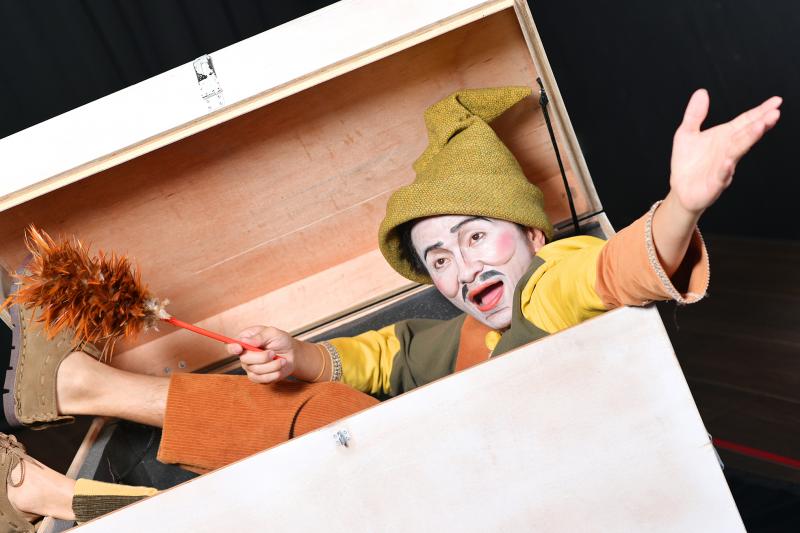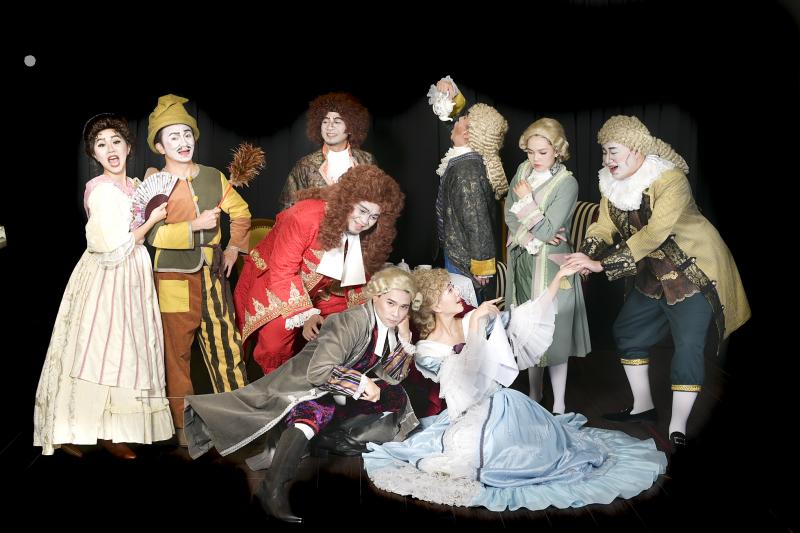New Taipei City-based Performance Workshop (表演工作坊) is beginning the new year by launching what it calls a “classic reproduction tour” with a revival of its 1995 hit, The Servant of Two Masters (一夫二主), which opens tomorrow night at Taipei’s Metropolitan Hall.
Company founder Stan Lai (賴聲川) adapted an Italian comedia dell’arte classic, Carlo Goldoni’s 1743 masterpiece The Servant of Two Masters about Truffaldino, a scheming, jobless manservant who thinks he has struck gold when he accepts job offers from two different people, which proved so successful that the company went on to adapt two more of Goldoni’s plays, The Comedy of Sex and Politics and The Venetian Twins.
In the 18th century works, Lai found a simpatico spirit of improvisation, with the fast-paced banter and physical comedy that have also become the hallmarks of Performance Workshop productions.

Photo courtesy of The Performance Workshop
Lai’s witty adaptation added some touches that make The Servant of Two Masters relatable to contemporary audiences, be they Taiwanese in 1995 or those in Shanghai, where the troupe staged the play in 2015 and again in September of last year.
In Goldoni’s tale, Truffaldino has come up with what he thinks is a foolproof plan to double his wages — and his meal opportunities — but finds himself instead entangled in a web of hidden identities, star-crossed lovers and confused parents while remaining hungry because he has no time to eat.
The mess is not entirely of his own making, as he does not realize that one of his new bosses, Beatrice, is a woman pretending to be her dead brother, while the other is Florinda, the man who killed Beatrice’s brother, but is also the love of her life.

Photo courtesy of The Performance Workshop
There is also another pair of would-be lovers, Silvio and Clarice — whose father had betrothed her to Beatrice’s brother, Federigo — and who would appear to be free to wed now that Federigo is dead, except for the fact that Beatrice has shown up in Venice disguised as her brother to press his suit.
Confused yet? Don’t worry, everything — and everyone — is made clear in the end, but not before the hapless Truffaldino has to organize two simultaneous banquets, juggling not only the conflicting demands of his two masters, but a lot of plates being thrown at him as well.
Tang Tsung-sheng (唐從聖), who is perhaps better known as Action Tang, stars as Truffaldino, and has said in interviews that four months of rehearsals — and all those heavy plates to catch — have left his hands bruised and sore.
Lai directed the 1995 production, but has turned the reins for the revival over to his sister-in-law, actress/director Ismene Ting (丁乃箏).
Truffaldino’s two masters are played by Chu Chung-heng (屈中恆) — known to many for his television hosting gigs — and Lee Shao-chieh (李劭婕), with Wang Jing-guan (王鏡冠), Weng Quan-wei (翁銓偉), Lu Ming-yao (呂名堯), Chou Yu-jou (周宇柔), Yeh Hsin-wei (葉信威) and Lee Fu-jung (李芙蓉) rounding out the cast.
While celebrated set designer Nieh Kuang-yen (聶光炎) created the original staging, Lai has reworked it for the new show, while the lighting was once again done by Chien Lee-zen (簡立人) and the costumes by Cephas Studio.
The show will be performed in Mandarin.
Following this weekend’s shows the company heads to Taichung next weekend, followed by two shows in Kaohsiung at the end of the month and then in March, appearances in Tainan and Taoyuan.

May 11 to May 18 The original Taichung Railway Station was long thought to have been completely razed. Opening on May 15, 1905, the one-story wooden structure soon outgrew its purpose and was replaced in 1917 by a grandiose, Western-style station. During construction on the third-generation station in 2017, workers discovered the service pit for the original station’s locomotive depot. A year later, a small wooden building on site was determined by historians to be the first stationmaster’s office, built around 1908. With these findings, the Taichung Railway Station Cultural Park now boasts that it has

The latest Formosa poll released at the end of last month shows confidence in President William Lai (賴清德) plunged 8.1 percent, while satisfaction with the Lai administration fared worse with a drop of 8.5 percent. Those lacking confidence in Lai jumped by 6 percent and dissatisfaction in his administration spiked up 6.7 percent. Confidence in Lai is still strong at 48.6 percent, compared to 43 percent lacking confidence — but this is his worst result overall since he took office. For the first time, dissatisfaction with his administration surpassed satisfaction, 47.3 to 47.1 percent. Though statistically a tie, for most

In February of this year the Taipei Times reported on the visit of Lienchiang County Commissioner Wang Chung-ming (王忠銘) of the Chinese Nationalist Party (KMT) and a delegation to a lantern festival in Fuzhou’s Mawei District in Fujian Province. “Today, Mawei and Matsu jointly marked the lantern festival,” Wang was quoted as saying, adding that both sides “being of one people,” is a cause for joy. Wang was passing around a common claim of officials of the People’s Republic of China (PRC) and the PRC’s allies and supporters in Taiwan — KMT and the Taiwan People’s Party — and elsewhere: Taiwan and

Six weeks before I embarked on a research mission in Kyoto, I was sitting alone at a bar counter in Melbourne. Next to me, a woman was bragging loudly to a friend: She, too, was heading to Kyoto, I quickly discerned. Except her trip was in four months. And she’d just pulled an all-nighter booking restaurant reservations. As I snooped on the conversation, I broke out in a sweat, panicking because I’d yet to secure a single table. Then I remembered: Eating well in Japan is absolutely not something to lose sleep over. It’s true that the best-known institutions book up faster